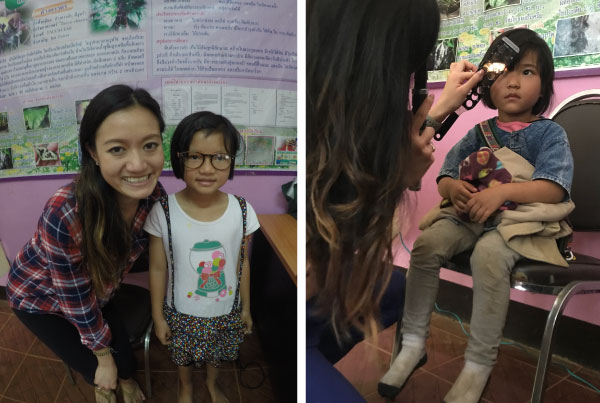Kim Duong, OD, MS, is no stranger to community service. The clinical assistant professor at the UAB School of Optometry has worked with children with Type 1 diabetes, provided vision screenings at volunteer events, and works with young girls in the Birmingham, Alabama, area, where she moved in July 2017 to join the School of Optometry faculty.
But recently, Duong, who received her Doctor of Optometry degree and master’s degree in vision science from SUNY College of Optometry, took her love for volunteering overseas. She traveled to Chiang Rai, Thailand, to provide eye care to underserved communities.
The experience strengthened her dedication to her profession and the desire to serve people, she says.
Q: Tell us about your trip and the team you worked with.
A: I worked with a group called Yogamour, a registered non-profit whose projects operate to support rural communities in third-world countries. I have always been interested in volunteering abroad. When I was contacted by one of my former mentors about an opportunity to work with children of a rural Akha hill tribe who have limited access to vision care, I was completely on board.
Q: Why did you choose to travel to Thailand?
A: I was interested in becoming more involved with international health care. Optometry in the United States is very advanced compared to the rest of the world. There is a large need for optometrists globally. There are currently only two optometry schools in Thailand. When I heard about the opportunity to volunteer in Thailand, I figured I could volunteer and visit the optometry schools in Thailand to see how I could further help.
Q: What did you learn about the people and the community where you served?
A: I learned so much from the Akha community. They are so kind and welcoming. We can get used to living in our own bubble, so it was really enlightening to see a different community. Concepts that are relatively common for us, like needing reading glasses as we get older, are completely foreign and inaccessible for some. I encountered so many people in their 50s and 60s who had sewed for a living but became unable to because they couldn’t see up close. Giving them a simple pair of reading glasses completely changed their life and made it possible for them to work again.
Q: What did you learn from this trip? And how will it help you in your career?
A: Being exposed to international health care was the biggest eye opener. I think it's great to go abroad to see firsthand what people need. Sometimes what we think they need is completely different from what they actually need for their everyday life. This was a great first step in my career to understanding the current health care situation in Thailand. The next objective is to help with sustainability and making sure health care is accessible even in the absence of volunteers. I hope to continue working with the schools in Thailand to help develop students and optometrists there.
Q: What was difficult about the trip?
Language and public health knowledge were huge barriers. Some of the Akha people speak a very specific dialect. Therefore, we often needed two translators: one from the Akha dialect to Thai, and one from Thai to English.
Public health knowledge was also a huge obstacle. Many believed that glasses are a valuable item and so many parents would instruct their kids to store the glasses in a safe place and wear it only during special occasions.
Q: What surprised you about this trip?
A: Myopia, also known as nearsightedness, is a huge problem in many countries, especially Asia. So I was expecting to find myopia in many children. Instead, I found very little myopia in the children I screened. There is a lot of research looking at what leads to myopia progression, and some of that revolves around environment, such as the amount of time spend outdoors. This was no scientific research but rather an interesting observation about how there is little technology in the Akha village and very little myopia there. The children spent a majority of their time outdoors.
Q: What was your favorite part about the trip?
A: Just spending time with the kids. They're excited about all the different tests and even more relieved that I'm not a dentist!
We were also able to install a water filtering system at the school so the children can now enjoy clean water.
Q: What got you interested in serving communities in need?
A: My family came to America with four little girls when I was 2. We didn't have much growing up. I am thankful everyday for the opportunities that I have been given and to those who have helped me along the way. I am a firm believer that everyone has the potential to be great, and if we can help foster an environment to success, we have done our part in the world.
Q: Tell us more about your community service in Birmingham.
A: Having just moved here 6 months ago, I am still trying to get my feet wet in the community. Last fall I coached a group of elementary school girls through a program called Girls on the Run. The program's mission is to empower young girls through running and teamwork. At the end of the fall season, we completed the Magic City 5k. I hope to get more involved in mentoring programs as well as more community eye screenings.
Q: Do you recommend optometry students and professionals to get involved in community service?
A: Absolutely! There's always someone out there that can use a lending hand!
